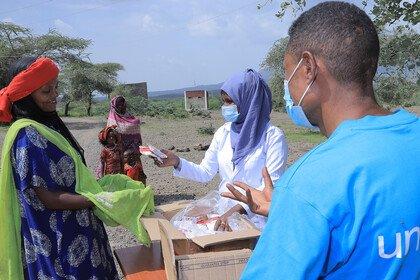
Can Europe invest now to avoid future lockdowns?
As heads of state and international organisations meet at the Paris Peace Forum, we ask whether investing in treatments now could help end this crisis.

Throughout Europe, countries have gone into new lockdowns. The Covid-19 pandemic is a social and an economic crisis just as much as it is a health crisis. The costs are too great for countries to be stuck in an endless cycle of lockdowns.
Lives and livelihoods
Lockdowns cause short-term economic losses but with the aim of getting the virus under control more quickly and allowing the economy to get back to normal sooner. There are no easy answers, but the economic costs of a prolonged pandemic are thought to be higher than the costs of a lockdown.
But lockdowns are only a short-term solution to buy more time and keep outbreaks under control. Vaccines, treatments and tests are the long-term solutions to ending the pandemic.
While recent results from vaccine trials are causes for optimism, that is only one of the tools needed. Better tests and treatments must be available to tackle outbreaks and stop further lockdowns.
"The time for talking is over. If we don’t act now, there will be a longer, much tougher road ahead. Societies around the world can only take so much of this. We have to change our approach, we have to change the fundamentals of this epidemic. There is a way to do this, there is an exit strategy. It is through the ACT-Accelerator."
The time to act is now
We need tests to provide a quicker and more accurate diagnosis of Covid-19, helping to stop its spread, and a greater range of treatments for those with mild to severe symptoms, to save lives and help reduce the burden on national health systems.
Pressing play on the video above will set a third-party cookie. Please read our cookie policy for more information.
We need a range of treatments for Covid-19 to cover all stages of the disease.
Why we need a range of treatments for Covid-19.
There isn't going to be a single 'cure' for Covid-19. The disease affects people in many different ways. From mild symptoms to life-threatening illness and long-Covid. So we need to develop different treatments.
Monoclonal antibodies could prevent severe disease if, given early. And antivirals could help hospitalised patients recover faster. What's more, all our bodies are different, so what works for one person, might be useless or even harmful for another. And different healthcare systems across the world need treatments they can deliver with the mean they have.
To give us all the best chance of beating Covid-19, we have to keep researching different treatment approaches and we need more funding for the scientists doing this work.
So far, dexamethasone is the only drug which has been shown to reduce mortality in hospitalised patients.
Early clinical trial results for another type of drug, monoclonal antibodies, have also shown encouraging signs – researchers are hoping to know whether these new drugs are effective by the end of the year.
But researchers have found that two other drugs that have been widely talked about, hydroxychloroquine and remdesivir, do not reduce the risk of dying of Covid-19 or the length of time people need to stay in hospital.
A global solution
Researchers are working at unprecedented speed to develop Covid-19 treatments, but they need more support. Of the total funding of $6.6 billion needed for therapeutics through the end of 2021, $750 million is an immediate need to intensify efforts on monoclonal antibodies.
It’s an investment that relies on countries and international organisations showing leadership, pooling resources together and acknowledging that this crisis can only be overcome if we act together.
The ACT-Accelerator
The Access to COVID-19 Tools (ACT) Accelerator is a global collaboration of health organisations, scientists, businesses, civil society, governments and philanthropies, including Wellcome, working together to get lifesaving tests, treatments and vaccines from the laboratory to the front line. An investment of $35 billion is urgently needed to fund that work.


